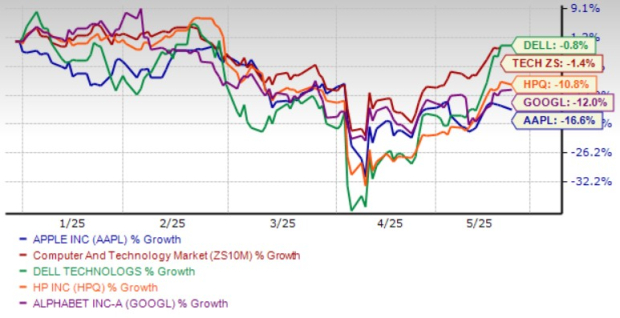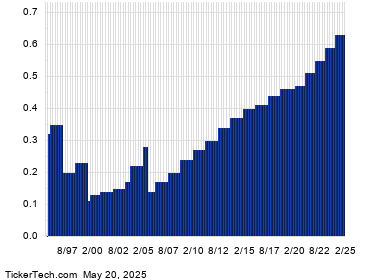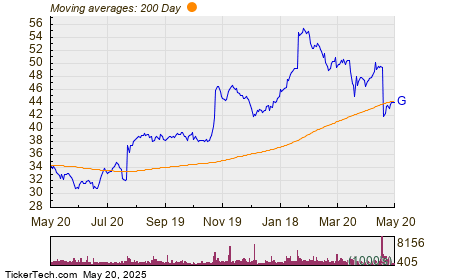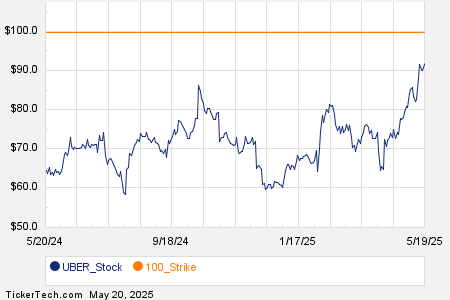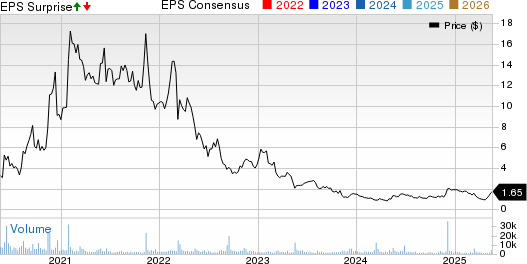Wall Street Reviews Recent 13F Filings Amid Economic Fluctuations
Over the past seven weeks, Wall Street has been bustling with activity. President Donald Trump recently revealed his tariff policy, temporarily paused reciprocal tariffs for 90 days, and negotiated a tariff rate reduction with China. Concurrently, the earnings season is in full swing, and U.S. economic data is being released almost daily.
Amid the ongoing economic developments, one crucial data release may have slipped under the radar: Form 13F filings.
A Form 13F offers a snapshot of stock and ETF transactions made by institutional investors managing at least $100 million in assets. The filing deadline was May 15 for reporting trading activity from the first quarter of 2025.
Although 13Fs may not provide the most immediate data—filed up to 45 days after a quarter’s end—they do give investors insights into the stocks and trends that capture the attention of leading asset managers.

Image source: Getty Images.
Institutional Investors Beyond Billionaires
While many investors may recognize figures like Warren Buffett, they might overlook that several major companies also act as investors.
Take Alphabet (NASDAQ: GOOGL) (NASDAQ: GOOG), for instance. Well-known as the parent company of Google, Alphabet held an impressive 89.66% share of the global internet search market in April. This strong market dominance provides the company with significant advertising power.
Moreover, Alphabet’s cloud infrastructure service, Google Cloud, ranks third globally in customer spending, according to estimates from Canalys. Notably, the margins for cloud services exceed those of traditional advertising, and AI integration could further boost growth for this segment.
Interestingly, Alphabet also maintains an investment arm, concluding the first quarter of 2025 with $1.58 billion spread across 40 holdings. Many of these positions involve businesses with which Alphabet collaborates on various projects.
During the first quarter, Alphabet made a substantial investment in a rapidly growing company whose stock has soared 562% over the past year, while divesting from a well-known AI stock that was among its largest holdings.
A New Challenger in Cellular Connectivity
According to Alphabet’s 13F, none of its pre-existing positions were increased during the March quarter; however, it did add three new stocks to its portfolio, notably AST SpaceMobile (NASDAQ: ASTS). Alphabet acquired 8,943,486 shares of AST SpaceMobile, marking it as the company’s third-largest holding, accounting for roughly 12.9% of its invested assets.
AST SpaceMobile aims to deliver cellular connectivity globally by launching high-powered satellites that work with standard smartphones. Contrary to past attempts, such as those by Iridium Communications, AST SpaceMobile’s technology does not require special devices. By 2030, the company targets the deployment of 155 satellites.
Investor excitement for AST SpaceMobile stems from its extensive partnerships and agreements, including major players like AT&T and Verizon Communications. Together with its 40+ mobile network operator partnerships, AST SpaceMobile stands to tap into over 2.5 billion cellular customers.
The company’s growth projections are stunning. After generating $4.42 million in sales last year, analysts predict AST SpaceMobile could reach over $1.3 billion by 2027, with a goal of achieving $3 billion in revenue by 2028. Earnings estimates suggest the possibility of recurring profitability by 2027.
However, AST SpaceMobile faces considerable risks. Satellite construction and launch are capital-intensive endeavors, and fluctuating material costs pose challenges. Initial estimates for each Block 2 BlueBird satellite projected costs around $20 million, but heightened material expenses due to tariffs now suggest a price range of $21 to $23 million per satellite, according to SpaceNews.
Moreover, accurately predicting growth for early-stage companies with disruptive technologies remains challenging. With an approximately $8.8 billion market cap, AST SpaceMobile’s potential for large near-term losses and share dilution might concern investors.

Image source: Getty Images.
Cybersecurity Stocks Face Uncertain Futures
On the flip side, Alphabet divested from several stocks in the first quarter, with none being more notable than AI-driven cybersecurity firm CrowdStrike Holdings (NASDAQ: CRWD).
As 2023 closed, Alphabet held…
# Alphabet Reduces CrowdStrike Stake, Leaving Investors Curious
Alphabet significantly trimmed its investment in CrowdStrike, selling off 1,283,683 shares in total, which had previously accounted for the second-largest holding by market value in its portfolio. As of the first quarter of 2025, Alphabet cut its stake by 353,665 shares, representing an 83% decline from the previous quarter, leaving just 74,230 shares remaining. Over the last five quarters, 94% of this once-prominent position has been divested.
Reasons Behind Alphabet’s Selling Activity
There appear to be three primary factors contributing to this ongoing selling trend. First, Alphabet may be capitalizing on profits. When the company first acquired this position in late 2022 and early 2023, CrowdStrike’s stock was valued in the low $100s. Subsequently, much of Alphabet’s selling occurred with CrowdStrike trading between $300 and $400.
Secondly, valuation poses a concern for investors. CrowdStrike’s expected revenue of $4.79 billion for the current fiscal year reflects a 21% year-over-year growth. This projection would yield a price-to-sales ratio of nearly 23. Moreover, the company is trading at 127 times its forecasted earnings per share, suggesting a premium valuation that leaves little room for missteps.
Lastly, recent issues with CrowdStrike’s Falcon security platform, specifically a faulty update in July 2024, have raised concerns. The glitch affected users of Windows operating systems worldwide. While the company addressed the issue, potential short-term impacts on customer retention remain a concern.
Opportunities in Cybersecurity
On a positive note, cybersecurity has increasingly become essential for businesses. As organizations transition their data online and into the cloud, the responsibility to secure that information often shifts to third-party providers like CrowdStrike.
Moreover, CrowdStrike’s customer base has been rapidly adopting additional services. At the conclusion of its fiscal 2025 on January 31, nearly half of its customers were using at least six cloud subscription modules. The company’s subscription-based model has yielded an impressive adjusted subscription margin of 80%.
While it may take time for CrowdStrike to align its growth with its high valuation, its long-term prospects remain promising.
Considerations for Investors
Before making any investment decisions, consider how Alphabet’s actions might influence future market perceptions of CrowdStrike’s value. The company’s substantial position change could signal valid concerns or strategic shifts that warrant analysis.
Suzanne Frey, an executive at Alphabet, is a member of The Motley Fool’s board of directors. Sean Williams has positions in AT&T and Alphabet. The Motley Fool has positions in and recommends Alphabet and CrowdStrike. The Motley Fool recommends Verizon Communications. The Motley Fool has a disclosure policy.
The views and opinions expressed herein are those of the author and do not necessarily reflect those of Nasdaq, Inc.

